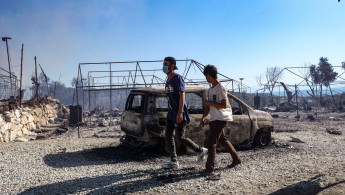Moving Moria migrants is humanitarian imperative: Red Cross
Francesco Rocca, president of the International Federation of Red Cross and Red Crescent Societies (IFRC), said containing migrants for years on the Greek islands was no solution to the crisis.
The fire on Tuesday at Greece's largest migrant camp destroyed the official part of the Moria facility, which housed 4,000 people. A second blaze on Wednesday destroyed most of the remaining camp where another 8,000 lived in tents and makeshift shacks around the perimeter.
"There is an urgent need to move migrants from the Greek islands to the mainland," Rocca told a virtual press conference in Geneva.
Following the fire, "evacuating migrants out of the Greek islands is no longer an option - it is a humanitarian imperative.
"Thousands of people are living in unacceptable conditions on the Greek islands.
"This is a European crisis which requires concrete acts of solidarity by EU member states. Simply containing people is not the solution."
Lesbos is the main port of entry for arrivals in EU member state Greece because of its close proximity to Turkey. The Moria camp was several times over its official capacity.
Rocca visited the camp in early March as the Covid-19 crisis took off in Europe.
He said the situation there was "desperate", with some refugees stuck in Moria for four to six years.
|
|
"No human being should live in the conditions in an overcrowded camp like in Moria," he said.
He said Moria was "something that must end", saying it could be a transit facility where migrants stay for a few days before being moved onwards into the European Union.
Thousands of Moria asylum seekers were camping on roadsides on Thursday.
Rocca said they were now in a "terrible situation".
"Local people, NGOs, the Red Cross, everyone is doing their utmost. But for how long?" he said.
"We must speed up the move of these people from the island."
Rocca was speaking as the Geneva-based IFRC launched its "Least Protected, Most Affected" report on the risks facing migrants and refugees during the Covid-19 pandemic.
It called for all migrants to have access to essential health care without fear of arrest, detention or deportation, including Covid-19 testing, tracing, education and treatment.
Follow us on Facebook, Twitter and Instagram to stay connected




 Follow the Middle East's top stories in English at The New Arab on Google News
Follow the Middle East's top stories in English at The New Arab on Google News

![A group of Palestinians, foreign and Israeli activists gather to participated in an olive picking event on the land in the town of Battir, which is under threat of confiscation by Israel in Bethlehem, occupied West Bank on 8 November 2024. [Getty]](/sites/default/files/styles/image_330x185/public/2182930803.jpeg?h=199d8c1f&itok=__0LgGsa)
